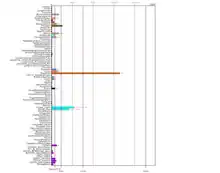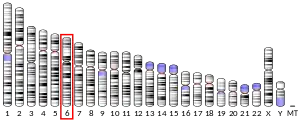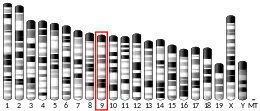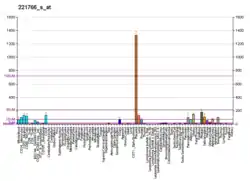FAM46A
Protein FAM46A is a protein that in humans is encoded by the FAM46A gene. Aliases for Fam46A include HBV X-Transactivated Gene 11 Protein, C6orf37, and XTP11.[5] The gene contains 6 introns, and is 6982 base pairs long.[6] The transcribed mRNA is 2231 base pairs long and contains 2 exons, 589 and 1128 base pairs, with 4 alternative splice isoforms.[7]
| TENT5A | |||||||||||||||||||||||||||||||||||||||||||||||||||
|---|---|---|---|---|---|---|---|---|---|---|---|---|---|---|---|---|---|---|---|---|---|---|---|---|---|---|---|---|---|---|---|---|---|---|---|---|---|---|---|---|---|---|---|---|---|---|---|---|---|---|---|
| Identifiers | |||||||||||||||||||||||||||||||||||||||||||||||||||
| Aliases | TENT5A, C6orf37, XTP11, family with sequence similarity 46 member A, terminal nucleotidyltransferase 5A, FAM46A, OI18 | ||||||||||||||||||||||||||||||||||||||||||||||||||
| External IDs | OMIM: 611357 MGI: 2670964 HomoloGene: 23032 GeneCards: TENT5A | ||||||||||||||||||||||||||||||||||||||||||||||||||
| |||||||||||||||||||||||||||||||||||||||||||||||||||
| |||||||||||||||||||||||||||||||||||||||||||||||||||
| |||||||||||||||||||||||||||||||||||||||||||||||||||
| |||||||||||||||||||||||||||||||||||||||||||||||||||
| Wikidata | |||||||||||||||||||||||||||||||||||||||||||||||||||
| |||||||||||||||||||||||||||||||||||||||||||||||||||
Expression
Expression of Fam46A is found to be exceptionally high in Placental tissue, Pineal Gland, and Pituitary Gland with low to moderate expression within Bone Marrow, Uterus, and Salivary glands.[8]

Protein
The human FAM46A protein is 461 Amino Acids long.[9]
Function
The function of Fam46A is currently unknown but there is a Variable Number Tandem Repeat in the first exon of Fam46A that has been explored within various populations and have been attempted to be linked to various retinal diseases as well as colon cancer.[10][11]
References
- GRCh38: Ensembl release 89: ENSG00000112773 - Ensembl, May 2017
- GRCm38: Ensembl release 89: ENSMUSG00000032265 - Ensembl, May 2017
- "Human PubMed Reference:". National Center for Biotechnology Information, U.S. National Library of Medicine.
- "Mouse PubMed Reference:". National Center for Biotechnology Information, U.S. National Library of Medicine.
- "Fam46A (Protein Coding)". GeneCards. GeneCards. Retrieved 18 February 2015.
- "NCBI Gene". NCBI. National Center for Biotechnology Information.
- "FAM46A Ace View". AceView. NCBI. Retrieved 3 March 2015.
- "Fam46A Tissue Expression". Protein Atlas. Retrieved 13 March 2015.
- "FAM46A Ace View". AceView. NCBI. Retrieved 3 March 2015.
- Barragán I, Borrego S, Abd El-Aziz MM, El-Ashry MF, Abu-Safieh L, Bhattacharya SS, Antiñolo G (January 2008). "Genetic analysis of FAM46A in Spanish families with autosomal recessive retinitis pigmentosa: characterisation of novel VNTRs". Annals of Human Genetics. 72 (Pt 1): 26–34. doi:10.1111/j.1469-1809.2007.00393.x. PMID 17803723. S2CID 2087472.
- Cui J, Wang W, Wang M, Lin J, Ma Y, Ruan WJ, Xu J, Lai MD (July 2006). "[VNTR polymorphism of C6orf37 in Chinese population]". Zhejiang da Xue Xue Bao. Yi Xue Ban = Journal of Zhejiang University. Medical Sciences. 35 (4): 354–9. doi:10.3785/j.issn.1008-9292.2006.04.002. PMID 16924696.
Further reading
- Colland F, Jacq X, Trouplin V, Mougin C, Groizeleau C, Hamburger A, Meil A, Wojcik J, Legrain P, Gauthier JM (July 2004). "Functional proteomics mapping of a human signaling pathway". Genome Research. 14 (7): 1324–32. doi:10.1101/gr.2334104. PMC 442148. PMID 15231748.
- Cui J, Wang W, Lai MD, Xu EP, Lv BJ, Lin J, Ruan WJ, Ma Y, Yao C (June 2006). "Identification of a novel VNTR polymorphism in C6orf37 and its association with colorectal cancer risk in Chinese population". Clinica Chimica Acta; International Journal of Clinical Chemistry. 368 (1–2): 155–9. doi:10.1016/j.cca.2005.12.043. PMID 16545789.
- Lim J, Hao T, Shaw C, Patel AJ, Szabó G, Rual JF, Fisk CJ, Li N, Smolyar A, Hill DE, Barabási AL, Vidal M, Zoghbi HY (May 2006). "A protein-protein interaction network for human inherited ataxias and disorders of Purkinje cell degeneration". Cell. 125 (4): 801–14. doi:10.1016/j.cell.2006.03.032. PMID 16713569. S2CID 13709685.




